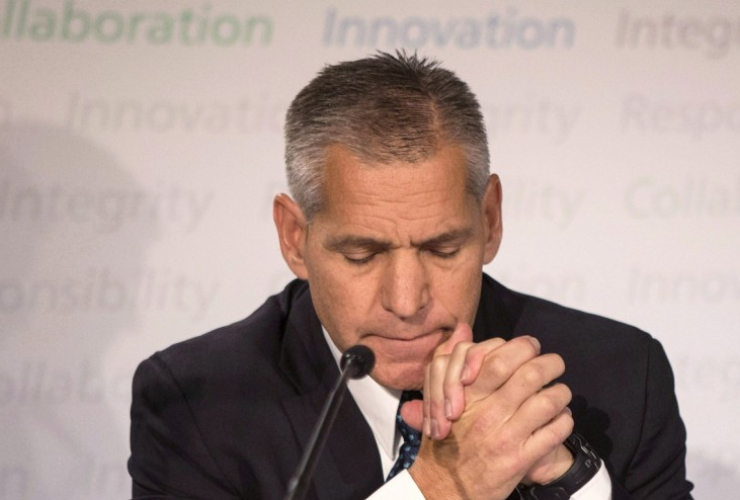Fifth in an in depth series about the National Energy Board. Part I here, Part II here, Part III here, Part IV here.
Canada’s pipeline watchdog is under investigation by Parliament’s information commissioner for deleting an email that drew attention to a mistake made by an employee, said a spokesman from the National Energy Board (NEB) on Wednesday.
An internal NEB email revealed that the employee who made the mistake was the pipeline regulator's head of security.
The NEB staff believe the deleted email contained references to how the regulator’s top security official had given personal information about a co-worker to a private investigator.
But the email disappeared from the records of the Calgary-based NEB after a senior bureaucrat instructed staff to delete it.
People can go to jail or pay hefty fines in the thousands of dollars for deleting records of the federal government’s day-to-day business and operations, under Canada’s access to information legislation. The NEB denied it broke the law.
An NEB spokesman said that the contents of the deleted email had revealed it shared information about its employee with a potential contractor without verifying the firm’s security clearance. The spokesman also told National Observer that NEB staff decided to delete the email to mitigate the risk of “harm” caused to the employee whose name was mentioned in the correspondence.

Both the regulator and the pipeline industry have been under scrutiny from environmentalists, Indigenous peoples and the public in recent years due to mounting concerns about spills, explosions and the carbon pollution from fossil fuels that contribute to climate change.
The case of the deleted email is also one of several recent files showing that the NEB is struggling to cope with its obligations to be open and transparent as required by Canada’s Access to Information Act.
Destroying a federal record, with the intent of denying the right of Canadians to access government information, is an indictable offense, according to the Access to Information Act. This could lead to fines of up to $10,000 and up to two years in prison.
The legislation requires federal government organizations to release information within 30 days upon request from any Canadian who pays the $5.00 fee. The law also allows federal organizations to censor records or request delays under certain exceptional circumstances.
The legislation allows the deletion of some records that are not directly related to government business. Bureaucrats refer to these types of records as “transitory documents” which can be deleted if they haven't been requested by anyone through the access legislation.
Green Party leader Elizabeth May said this case and other recent revelations about Canada's pipeline watchdog show that the NEB management needs a major overhaul.
“The whole story of deleted emails could mean nothing or could be a significant violation of an employee’s privacy,” said May, who used to practice as a lawyer. “No matter which it was, in the context of earlier revelations of the cozy relationship between the NEB and pipeline companies, at a minimum it confirms a sloppy, poorly managed organization.”

In British Columbia, a recent controversy, known as the triple delete email scandal has resulted in charges against a government staffer who was accused of violating provincial freedom of information legislation. That case revolved around the B.C. government’s response to a request for access to emails related to a region known for its links to missing and murdered women.
The federal Information Commissioner's office has said that it would review a decision made by the Canada Revenue Agency to destroy all archived records of text messages from its staffers on a government server.
Highly unusual
The deleted email at the NEB was originally sent in late August, but these revelations are only being disclosed now, for the first time, as a result of a release to National Observer - through federal access to information legislation - of senior management’s written instructions to delete the message.
The instructions indicated that the email targeted for deletion was sent to the NEB’s head of security, Lee Williams, in the middle of the night in late August. Management wanted staff to remove it from his inbox three days after it was received, even though he was not in the office at the time.
“Please remove email sent from a third party to Lee Williams on Tuesday 25 August at 2:40 a.m.,” wrote Meghan Ruholl, the acting vice president of enterprise business services, in an Aug. 28 email to other staff.
A Vancouver-based security firm that allegedly sent the email has declined to comment on the matter.
It was not immediately clear whether Ruholl was carrying out orders she received from other senior executives at the NEB. But it is highly unusual for senior bureaucrats in Canada’s public service to send written instructions for staff to delete all traces of a specific record from an organization's computer hard drives and servers.
Fear of discipline
In response to an access to information request, the NEB said it couldn't retrieve the email that Williams received from the potential contractor, because it had already deleted it, after deciding that it was a transitory record. The regulator told the information commissioner’s office that it believed it was entitled to do this, an NEB spokesman said.
“The NEB has outlined (to the commissioner’s office) why the email was treated as a transitory document and deleted,” NEB director of public affairs and media relations Craig Loewen told National Observer in a written statement. “The requested email had no enduring business value and did not support the carrying out of the NEB's functions. The NEB firmly believes this email was deleted in compliance with the Access to Information Act.”
A retired NEB employee who was familiar with the issue said that some staff - aware of the instructions to delete the email - disagreed with management.
NEB executives were attempting to prevent any release of information revealing that someone had made a mistake that could 'affect the board’s functions', the former employee added.
But this source also said the regulator’s employees were reluctant to make formal complaints or fight back against the instructions to delete the email, out of fear they would be disciplined.
“I think they would be afraid to do that,” said the source, who asked not to be named. “The NEB has a track record of removing employees who are seen to be difficult.”
National Observer has independently confirmed that NEB employees were afraid to file a formal complaint. The NEB declined to immediately respond to this allegation.
But the source said the staff would likely provide all details about what was deleted if they are questioned by an investigator from the information commissioner’s office.
Extraordinary powers
Under its own legislation, the NEB has powers equivalent to a federal court, and it can impose sanctions on those that break pipeline safety rules.
The regulator, which has about 500 employees, also has extraordinary powers to investigate issues under its jurisdiction such as pipeline safety.
But inside the NEB, the staff are getting increasingly frustrated with what the regulator's senior executives are doing to fulfill its mandate, internal survey results show.
The surveys indicate that there are an increasing number of employees within the organization who don't understand the decisions and actions taken by their managers.
Even the NEB's spin doctors - the staff who communicate the regulator's decisions to the public - were having a hard time understanding what their managers were doing, according to the internal surveys. The last available employee survey from 2015, revealed that five out of 14 of employees or 36 per cent of those surveyed who worked on "strategic communication" said they didn't “understand the reasons for management decisions and direction.”
Out of 26 employees surveyed in the executive office, 27 per cent said they didn't understand what the executives were doing. There were lower levels of concerns expressed among employees in legal services and operations.
The NEB is now paying a consulting firm, Ernst & Young, up to $522,206 to help it fix its management problems.

Risk of harm
The NEB’s spokesperson, Loewen, declined to name the employees affected by the deleted email, but he confirmed that one staff member shared information about a colleague with a contractor “without validating (whether) the potential contractor held a valid security clearance.”
“The potential contractor used the personal information in an email they sent back to the NEB,” said Loewen. “As this e-mail was determined to only be necessary for a limited time in a matter that the Board chose not to pursue, and because the NEB wanted to mitigate the risk of harm related to the employee whose information was inadvertently released, NEB staff made the decision to delete the incoming e-mail from the recipient's e-mail inbox. The NEB employee who received the email is aware that it was deleted.”
It took the NEB more than two weeks to respond to National Observer’s questions about the deleted email and provide this explanation.
National Observer requested interviews with multiple NEB staff, including Williams (the head of security) and Ruholl (the vice president who instructed staff to delete the email ) and Rob Cohen, the NEB’s top lawyer. But Williams, Ruholl and Cohen, as well as most staff, declined requests for comment or to be interviewed on the record.
Politically-appointed members of the NEB, including chairman and NEB CEO Peter Watson, declined interview requests. Watson and the other Board members also declined to respond to written questions asking what the NEB knew about the situation and when they learned about it.
The NEB has also said in a response to a separate access to information request that its lawyers kept no records showing whether they were consulted or whether they provided any advice to senior management about deleting the email.
When asked by National Observer, Loewen and other NEB staff declined to explain whether the lawyers were consulted orally. They also declined to say whether the NEB informed the employee whose information was shared with the contractor.
“The above is the NEB’s final response on this matter,” Loewen told National Observer.
May said that it would have been important for the NEB to consult its lawyers about the issue since the deletion of the email could deprive the unnamed employee of evidence, should he or she decide to take legal action against the NEB.
“We do not know the gravity of the information shared and whether… it did permanent damage to the employee or his prospects of promotion, or dismissal,” said May, MP for Saanich-Gulf Islands in British Columbia.
Secrecy at the NEB
The deleted email is not the only significant record that appears to be missing from the NEB — a regulator that Prime Minister Justin Trudeau’s Liberal government has promised to “modernize” as part of efforts to restore public trust in federal oversight of industry.
A former TransCanada Corp employee, who met with NEB staff at its Calgary headquarters in September 2014 to discuss serious safety issues, told National Observer that he doesn’t know what happened to all of the evidence he turned over to staff and notes taken by an NEB employee about his allegations.
He explained that his first formal meeting with NEB staff, a few days after he lost his job as a heavy equipment operator with TransCanada, did not begin until an NEB employee arrived to take notes.
He said he remembered this because he was told that the employee was just returning from maternity leave.
Both the NEB and TransCanada said that the investigation found no immediate threat to safety and that all issues raised by the whistleblower were resolved, without requiring any sanctions.
If the notes from the first formal meeting between the whistleblower and the NEB were retained and could be released, they could help resolve a dispute between the two sides about what they discussed.
The whistleblower has alleged that the NEB wasn't taking his allegations seriously and was delaying its investigation. The NEB has alleged that the whistleblower told its staff that his allegations didn't represent an immediate threat to safety.
“Many times, I have emailed (NEB vice-president of operations) Chris (Loewen) saying I want to compare notes,” the whistleblower said.
The whistleblower also filed several access to information requests, but many of the pages he received, in response, were censored and did not reveal whether the NEB had retained notes from that meeting.
“They don't want to know what I said in that meeting,” the whistleblower said. “No one wants to know, because I was pretty blunt.”
He also expressed fresh concerns about whether the NEB took his complaints seriously after reading recent reports by National Observer that detailed informal meetings taking place between the regulator and industry representatives. He said these showed that the NEB was too close to the company under investigation.
Legal and engineering experts say that the NEB should refrain from informal meetings with industry because it could compromise ongoing investigations or lead the public to believe it is bias, National Observer reported earlier in March. Legal experts also say that the NEB should keep proper records of all meetings with stakeholders, for the same reasons.
But NEB staff also counter that, as an industry regulator, it is required to balance its access to the records of private corporations with the right of Canadians to access government information.
Refusal and delays
In two more recent cases, involving requests for NEB records on pipeline safety issues, the regulator has refused to release information, despite being up to two months behind schedule on its own recommended time extensions.
One of those cases involved a request for emails regarding a Transportation Safety Board of Canada report that revealed the NEB had failed to act on a warning from another TransCanada whistleblower, Evan Vokes, about a defect that contributed to a 2013 pipeline rupture a few hundred metres away from a hunting cabin, near Fort McMurray, Alberta.
Staff said the delays — which violate the access law — were caused by NEB lawyers. The lawyers waited until a few days before the response deadline to request more consultations with other government officials, outside the NEB.
As a result, the NEB has still not released some requested records, saying it needs more time to complete these consultations.
Editor's note: This story has been modified to clarify that the NEB spokesman did not directly identify that the organization's head of security was the employee who made the mistake.










Comments